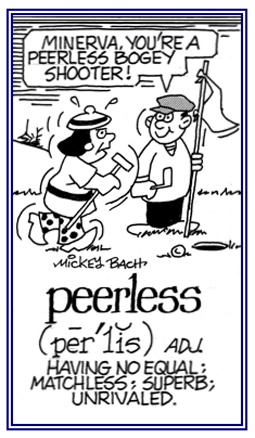peer, pair
(Latin: same, equal, similar)
This peer unit mutated into the forms seen here directly from the family of pari-, par- words.
1. A person of equal status or rank; a peer.
2. A comrade, companion, or associate.
3. Someone who is a close companion or associate of somebody else.
2. A comrade, companion, or associate.
3. Someone who is a close companion or associate of somebody else.
pair
1. Two matching objects that are designed to be used together.
2. A garment or article consisting of two matching or identical parts joined together.
3. Two people who are doing something together, or who are considered together because there is some connection between them.
4. Etymology: "two of a kind, coupled in use", from Old French paire, from Latin paria, "equals"; from par, "a pair, counterpart, equal", a noun use of the adjective form of par, "equal".
2. A garment or article consisting of two matching or identical parts joined together.
3. Two people who are doing something together, or who are considered together because there is some connection between them.
4. Etymology: "two of a kind, coupled in use", from Old French paire, from Latin paria, "equals"; from par, "a pair, counterpart, equal", a noun use of the adjective form of par, "equal".
1. A person of the same legal status; such as, a jury of one's peers.
2. Someone who is equal to another in abilities, qualifications, age, background, and social status.
3. Something of equal worth or quality.
4. A member of any of the five degrees of the nobility in Great Britain and Ireland (duke, marquis, earl, viscount, and baron).
5. Etymology: from Anglo-French peir, Old French per; from Latin par, "equal"; an equal in civil standing or rank.
2. Someone who is equal to another in abilities, qualifications, age, background, and social status.
3. Something of equal worth or quality.
4. A member of any of the five degrees of the nobility in Great Britain and Ireland (duke, marquis, earl, viscount, and baron).
5. Etymology: from Anglo-French peir, Old French per; from Latin par, "equal"; an equal in civil standing or rank.
1. Noblemen and noblewomen considered as a class or a group: All the aristocracy, or the peerages, of the city were invited to the celebration of the outstanding stars of the new movies of that yar.
2. The rank or title of a nobleman or noblewoman: The peerages in the important meeting included the dukes, the counts, and the baronets.
3. A book listing the members of the nobility: The peerage of the elite persons in the city gave information about their families.
2. The rank or title of a nobleman or noblewoman: The peerages in the important meeting included the dukes, the counts, and the baronets.
3. A book listing the members of the nobility: The peerage of the elite persons in the city gave information about their families.
peeress
1. A woman who is a peer.
2. The wife or widow of a peer.
2. The wife or widow of a peer.
peerless (adjective), more peerless, most peerless
1. Eminent beyond or above comparison: Professor Karl Monroe is a peerless anthropologist who is not only a professor at a university, but also, a scholar who travels to Africa very often to learn more about the cultures of the various native groups who live there.
2. So good as to have no equal: Monroe was a peerless athlete at his university which made it easy for him to become a professional football player.
3. Etymology: from Latin parare, "to make equal"; from par, "equal"

© ALL rights are reserved.
Go to this Word A Day Revisited Index
2. So good as to have no equal: Monroe was a peerless athlete at his university which made it easy for him to become a professional football player.
3. Etymology: from Latin parare, "to make equal"; from par, "equal"

Go to this Word A Day Revisited Index
so you can see more of Mickey Bach's cartoons.
peerlessly
A descriptive term for having no equals; matchless.
peerlessness
A situation whereby there is no peer or equal; being matchless; superlative.
Inter-related cross references, directly or indirectly, involving word units dealing with "equal, identical, same, similar": auto-; emul-; equ-, equi-; homeo-; homo-; iso-; pari-; rhomb-; syn-; tauto-.
<img src="/img/left_arrow_sm.gif" alt="" /> <img src="/img/right_arrow_sm.gif" alt="" />
Showing 1 page of 8 main-word entries or main-word-entry groups.
